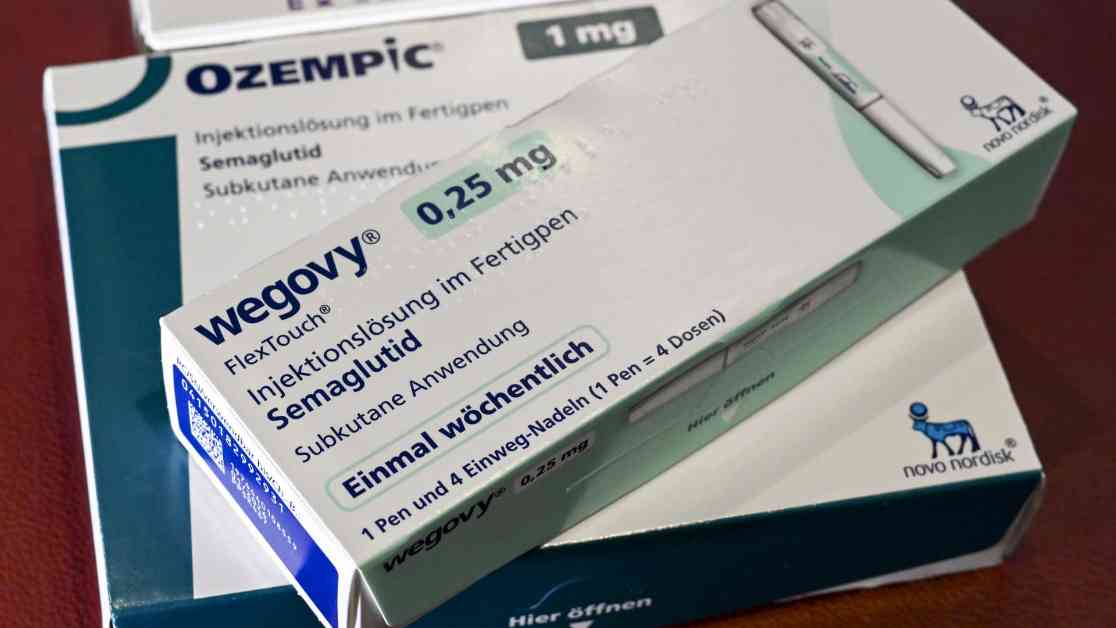Weight loss drugs have long been a popular option for individuals looking to shed excess weight and improve their overall health. However, recent research has uncovered a surprising new benefit of these medications – a reduced risk of mortality from Covid-19. Specifically, individuals taking the key component of weight loss drugs Ozempic and Wegovy, known as semaglutide, were found to have a lower likelihood of dying from the virus compared to those not taking the drug.
The findings, published in a series of studies by the Journal of the American College of Cardiology (JACC), have significant implications for public health and the ongoing battle against the pandemic. According to the research, individuals who were already being treated with a 2.4 mg dose of semaglutide had a 33% lower chance of dying from Covid-19. This is a substantial reduction in mortality rates and highlights the potential of weight loss drugs to not only aid in weight reduction but also in combating the effects of the virus.
Subheadings:
The Impact of Semaglutide on Covid-19 Mortality Rates
Beyond Weight Loss: Additional Health Benefits of Semaglutide
The Future of Semaglutide and Weight Loss Drugs
The Impact of Semaglutide on Covid-19 Mortality Rates
The discovery of the potential link between semaglutide and reduced Covid-19 mortality rates has sparked interest and excitement within the medical community. The large-scale study, which involved over 17,600 individuals who were overweight or obese and had heart-related illnesses, provides compelling evidence of the drug’s effectiveness in combating the virus. While individuals taking semaglutide could still contract Covid-19, their chances of succumbing to the illness were significantly lower than those not taking the drug.
One of the study’s co-authors, Benjamin Scirica, highlighted the broader implications of the research, stating that patients receiving semaglutide also experienced a 29% reduction in deaths from causes not linked to heart events. This suggests that the benefits of semaglutide extend beyond cardiovascular health and may have a more profound impact on overall mortality rates. Additionally, weight was not found to be a significant factor in the reduced mortality rates, indicating that semaglutide’s effects may be independent of weight loss.
Beyond Weight Loss: Additional Health Benefits of Semaglutide
In addition to its potential role in reducing Covid-19 mortality rates, semaglutide has been found to offer a range of other health benefits. Studies published by JACC revealed that the drug improved symptoms associated with heart failure, inflammation, and various other physiological functions. Furthermore, semaglutide was shown to reduce deaths among patients with chronic kidney disease, highlighting its potential to address a wide range of health conditions beyond weight loss.
The newfound benefits of semaglutide have the potential to revolutionize the field of weight loss drugs and open up new avenues for research and treatment. As the pharmaceutical giant Novo Nordisk continues to innovate and develop semaglutide-based treatments, the possibilities for improving public health outcomes are vast. The drug’s ability to promote overall health and well-being, as noted by Harlan Krumholz of Yale University School of Medicine, suggests that weight loss may be just one of many positive effects of semaglutide.
The Future of Semaglutide and Weight Loss Drugs
The recent studies on semaglutide have shed light on the potential of weight loss drugs to not only aid in weight reduction but also in improving overall health outcomes and reducing mortality rates. As the pharmaceutical industry continues to invest in research and development, the future of semaglutide and other weight loss medications looks promising. The discovery of new benefits and applications for semaglutide could pave the way for further advancements in the field and offer new hope for individuals struggling with obesity and related health conditions.
While the findings of the studies are promising, further research is needed to fully understand the impact of semaglutide on Covid-19 mortality rates and other health outcomes. As more data becomes available and additional studies are conducted, the medical community will be better equipped to harness the potential of weight loss drugs in improving public health and combating the effects of the pandemic. In the meantime, individuals interested in weight loss medications should consult with their healthcare providers to determine the best course of treatment for their specific needs.
In conclusion, the research on semaglutide and its effects on Covid-19 mortality rates represents a significant development in the field of weight loss drugs. The potential of these medications to not only aid in weight reduction but also in improving overall health outcomes and reducing mortality rates is promising. As the pharmaceutical industry continues to innovate and invest in research and development, the future of semaglutide and other weight loss medications looks bright.

















